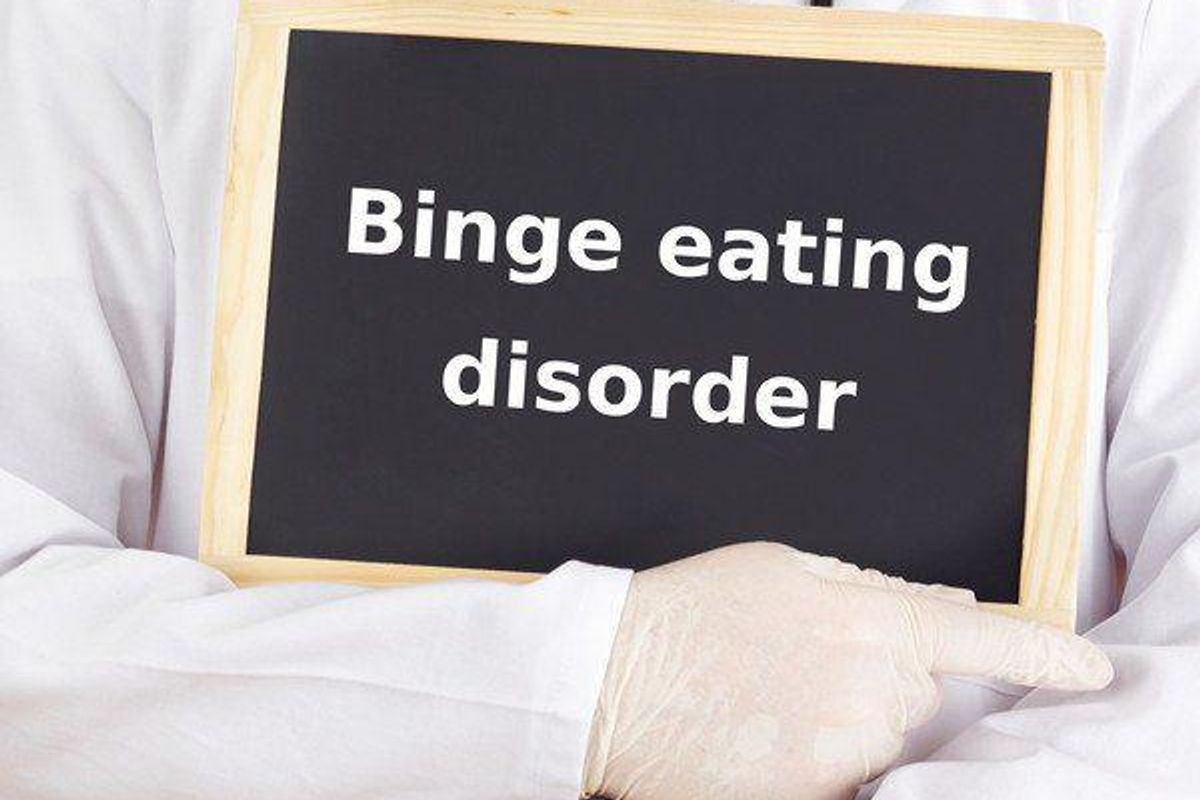Reviewed by Stacey M. Rosenfeld, PhD, author of Does Every Woman Have an Eating Disorder? Challenging Our Nation's Fixation with Food and Weight
After a really hard day, is there anything better than indulging in your favorite ice cream, cookie, cheese or chocolate? Couple that guilty pleasure with your favorite TV show and the sting of a bad day doesn't seem so horrible.
Many people turn to food for emotional comfort here and there—and that's OK. But do you ever wonder if turning to food as a coping mechanism is normal?
For many, it's not. Millions of Americans struggle with binge eating disorder (BED). BED is an illness that requires professional treatment. Now that it's officially recognized as a disorder in the Diagnostic and Statistical Manual of Mental Disorders (DSM-5), it's more common than anorexia or bulimia in the United States.
Unfortunately, BED is difficult to spot and often goes undiagnosed. The main diagnostic features of BED, according to the DSM-5 are:
- Loss of control over the amount you're eating.
- Marked distress over your binge episode.
- Binge eating occurs at least once a week for three months
- And at least three of the following occur:
- Eating more rapidly than normal
- Eating until you're uncomfortably full
- Eating large amounts of food when you're not hungry
- Eating alone because you're embarrassed by how much you're eating
- Feeling disgusted, depressed or very guilty after overeating
Binge eating also usually occurs in the absence of purging or other regular compensatory behaviors, such as extreme exercise.
The medical community is becoming more aware of this eating disorder, but health care professionals still may focus too much on weight and miss effectively treating the illness, according to Marsha Hudnall, MS, RDN, CD, president and co-owner of Green Mountain at Fox Run, a healthy living retreat in Ludlow, Vermont, that teaches healthful and mindful eating, and Kari Anderson, DBH, LCMHC, CEDS, president and chief clinical director of the Women's Center for Binge & Emotional Eating at Green Mountain.
This is because BED isn't really about weight. Not all overweight or obese people have BED and not everyone with BED is overweight or obese.
So how do you know if turning to that pint of ice cream is normal or not?
Here are some warning signs of BED, based on Hudnall and Anderson's more than 50 years of collective experience in treating eating disorders.
1) Life consumed by food: You might be obsessed with what you can and can't have in your day-to-day life. You might be too restricting and rigid in your approach toward food.
2) Frequent and extreme dieting or fasting: Not only do you constantly think about food, your weight likely yo-yos due to extreme dieting. You go on periods of extreme restriction and then lose control and gain it all back.
3) Binging at least once a week for three months: You habitually eat a very large amount of food in a short time. This habit of coping by turning to food is ingrained in your brain, and it's become a reward system that you need to give into.
4) Having a "last supper" mentality: During a binge, you eat abnormally large amounts and think you have to get rid of all the "bad" foods in the house. Then it won't be there in the morning. You resolve to get a fresh start and begin a new diet in the morning.
5) Hiding, obsessing and feeling excitement in binges: Not only do you have a fear of eating in public, you hide and get excited about being able to binge in private. Maybe you create schedules or rituals around binge sessions to ensure they happen in secrecy. Or you excitedly realize that no one will be home so you can go on a binge. You get rid of all the wrappers and food containers before anyone returns.
6) Binging to relieve tension: Binging is the coping mechanism you use to relieve tension or numb negative feelings. While you don't derive pleasure during the binge, it's a habit and reward system that has become ingrained.
6) Feeling shame and guilt: The binge is a reward, but you have tremendous amounts of shame and guilt during or after the binge. You experience an abnormal disgust with yourself that can contribute to depression, social isolation and poor self-esteem.
7) Not regularly purging: Typically people struggling with BED don't have purging episodes. You may tell yourself you will go on another diet the day after a binge, but you don't habitually purge.
8) Strong need to be control: Many women struggling with BED also struggle with control. They have tried to control their diets with an inflexible "all or nothing" attitude.
Treatment Options
When left untreated, BED can get worse over time and result in a very poor quality of life.
Treatments include specific types of cognitive behavioral therapy and interpersonal therapy, as well as medications including certain antidepressants (such as SSRIs) and anticonvulsants (such as topiramate).
Hudnall and Anderson believe it's important to help women feel empowered to make their own healthy lifestyle decisions. At Green Mountain, a team of specialists works with women in a safe, judgment-free environment where they learn how to be mindful in eating, moving and living. They take a non-diet approach to help women move away from obsessing over food and thinking it's the enemy.








